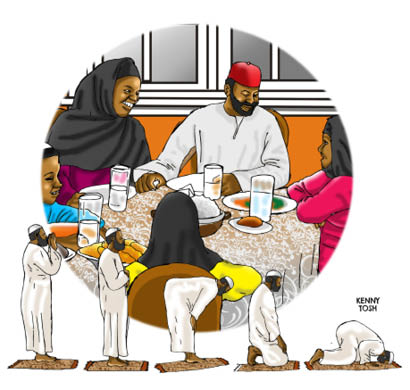As a universal religion, Islam is devoid of ethnic, racial or pre-eminence sentiments. That which unites Muslims together is belief in the oneness of Allah. To buttress this, Allah states in Qur’an 49:13 “O mankind! We created you from a single (pair) of a male and a female, and made you into nations and tribes, that ye may know each other (Not that ye may despise each other). Verily, the most honoured of you in the sight of Allah is (he whom is) the most righteous of you …”
In furtherance and within the context of the above verse of the Qur’an, Muslims are expected to be true representatives of their religion by being exemplary models for others in doing what is right and forbidding what is wrong. Muslims have a duty of ensuring that truth prevails over falsehood in order to guarantee the defeat of evil and injustice. Islam therefore lives, not for itself, but for mankind. It is in this regard that Allah (SWT) reveals Qur’an 3:110 “Ye are the best of peoples evolved for mankind, enjoining what is right, forbidding what is wrong, and believing in Allah…”
In truth, others are supposed to see and appreciate Islam through the words and actions of Muslims. The public and private life of Muslims should, expectedly, represent the teachings of Islam. A Muslim is naturally required to live a righteous life. He should be an ideal standard in terms of righteousness from whom fellow Muslims would be encouraged to do right. The righteous life of a Muslim is also supposed to attract non-Muslims to the beautiful and decent values of Islamic religion.
The teachings of Islam as outlined in the political, social, economic and spiritual principles of the religion have been designed to make Muslims virtuous in character, as individuals and as members of the Muslim community. Unfortunately, the life of many Muslims today seems to completely negate this fundamental concept. We are almost getting to a point where one would need to ask to ascertain whether or not the person you are relating with is a Muslim; all because of his or her complete lack of any attitudinal semblance of a Muslim. This is even as Muslims are supposed to be morally and decently unique for being “the best of peoples evolved for mankind.”
- Governor Bala: Between right of way and rights of people
- Police, bring perpetrators of Kano arson to book
The culture of Muslims is one that is absolutely founded and built on Islamic principles. Islam perfectly provides legislations for the clear-cut guidance of Muslims in every aspect of their life. This includes the way Muslims should look, talk, eat, dress, answer the call of nature, enter into and come out of our houses. Even the way we should, as Muslims, lie on our beds has been provided for. Buying, selling, neighbouliness, marriage, divorce, and inheritance all have their respective rules and regulations in the Qur’an and Sunnah of the Prophet Muhammad (SAW). All these collectively combine to shape what is called Islamic culture. Surprisingly enough, a lot of Muslims today appear to be suffering from a crisis of identity, or more critically, from a clash of civilizations.
Many of the contemporary female Muslims think the beauty of a woman is in indecent dressing. Today’s young girl dresses to look like a boy and vice versa; keeping them at the longest distance from Islam. Some of the photographs of today’s brides and grooms printed on wedding souvenirs are not befitting for the public to see. The extent of the hugging in such unbecoming photographs would irresistibly compel every right-thinking Muslim to ask whether or not those on the photographs are Muslims. The ‘fashion’ in which a Muslim bride wears a white wedding gown with her head, arms, and substantial part of her chest exposed is most unfortunate. While we urge scholars to intensify preaching against these western concepts, parents must be firm in inculcating and preserving Islamic tenets in their children.
Trustworthiness is one most-important virtue that has generally been abandoned by today’s Muslims. In this digital world of the 21st century, one would have to look round or check through thousands to find a reliable Muslim especially when and where the matter or object of trust involves power or woman. It is worse if the substance of trust were money. Because of the endemic nature of corruption in Nigeria, we have come to have more betrayers than honest persons among Muslims. The absence of upright leaders in positions of authority has dampened the country’s hope for a decent and corrupt-free Nigerian society.
Kindness, courtesy and humility which are some of the virtues that make Muslims unique from others, and by which others are attracted to Islam, have become scarce behavioural commodities. Humility and not pride makes a good Muslim. Humility and courtesy are acts of piety. The Prophet (SAW) said “Verily, Allah commands me to be humble and lowly and not to be proud; and that no one should oppress another”. The Prophet (SAW) who is a model of kindness and charity once said, “Charity is a duty unto every Muslim. He who possesses not the means thereto should perform a good act or abstain from the evil one. That is charity”.
A good Muslim speaks the truth when he talks; fulfils his promise; and discharges his trust accordingly. Sadly, many Muslims have become liars, and betrayers, which explains why the more you search for persons with these qualities among Muslims today, the less you find them. The unfriendly and uncourteous nature of contemporary Muslims, the widespread dishonesty and brazen fashion of betrayal among them, are indeed embarrassing to Islam. We call on Muslims to critically re-examine themselves with a view to ensuring that they live according to the provisions of the Qur’an and Sunnah of the Prophet (SAW).
It is belittling to the image of Islam that a Muslim cannot easily be identified by others through Islamic cultural values. Let us strive to remain good Muslims no matter how hard the devil struggles to take us off the track of guidance. Our thoughts and actions should be within the provisions of Shari’ah, which sufficiently deals with the most minute and delicate circumstances of life. The documented account of the Prophet Muhammad (SAW)’s traditions is a Muslim’s dictionary of morals and manners. May Allah preserve and protect the sanctity of our faith to enable us remain true Muslims in our words and in our actions, amin.

 Join Daily Trust WhatsApp Community For Quick Access To News and Happenings Around You.
Join Daily Trust WhatsApp Community For Quick Access To News and Happenings Around You.


